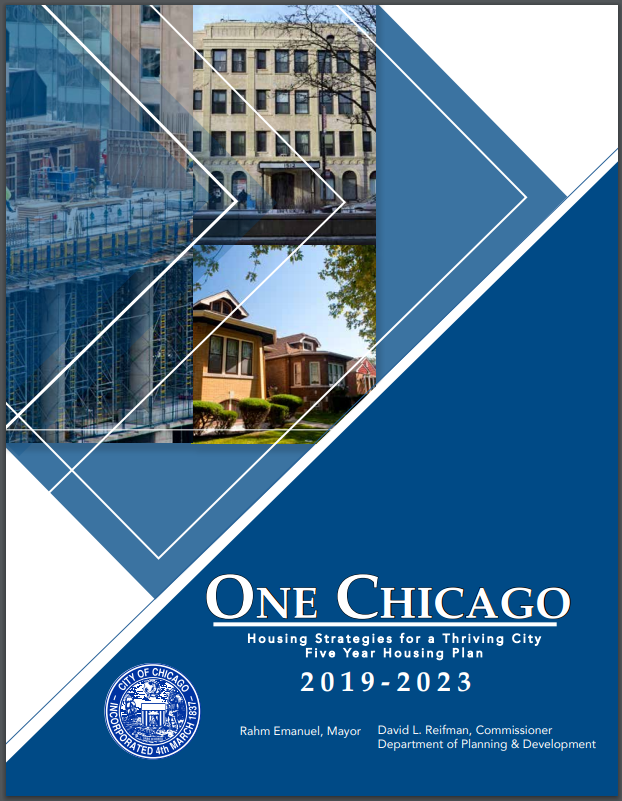2019-23 Five-Year Housing Plan: One Chicago
|
"One Chicago: Housing Strategies for a Thriving City" is the current Five-Year Housing Plan, adopted by City Council in December 2018. The plan seeks to provide for a more equitable neighborhood landscape, including the support of more affordable housing in gentrifying neighborhoods, more tools to help property owners combat displacement, and more incentives for new housing construction in under-invested neighborhoods. The plan was developed over a seven-month planning process with the assistance of approximately 120 housing professionals, more than twice as many as the previous five-year plan. Members of the public also added insight, participating in a public hearing and submitting more than 150 ideas through an online portal. Innovations incorporated into the plan include a three-tiered approach to the housing needs of different neighborhoods, including high-, moderate- and lower-cost submarkets. Questions and comments on "One Chicago" can be directed to doh@cityofchicago.org. |
Quarterly Reports
The Department of Housing is required to give quarterly progress reports to the City Council Committee on Housing and Real Estate. The reports will be posted in the chart below as they become available.
| 2019 | 2020 | 2021 | 2022 | 2023 |
| Q1 | Q1 | Q1 | Q1 | Q1 |
| Q2 | Q2 | Q2 | Q2 | Q2 |
| Q3 | Q3 | Q3 | Q3 | Q3 |
| Q4 | Q4 | Q4 | Q4 | Q4 |
NEW: Address-based Data from our Quarterly Reports
DOH is committed to making information about our programs public and easily accessible. To that end, we are now posting location-specific data in Excel format on our funding commitments under the Department’s housing production and preservation programs―the same information we use in preparing the Quarterly Reports.
The most recent release covers all of 2022. On the multi-family side, it includes affordable housing developments approved by the City Council along with data from our rental assistance programs. It also covers many of our single-family programs that serve new homebuyers along with existing owners in need of home improvement or repair services. One of our major programs, the Troubled Building Initiative (TBI), serves both multi- and single-family properties. To protect clients’ privacy, single-family records are not associated with exact street addresses; instead, they are assigned to block-level address ranges.
All data is geocoded by Ward and Community Area and can be sorted by program, funding source and income levels served. Most of our programs serving individual homeowners and tenants are combined in a single Excel worksheet (“SF Programs”). There are additional tabs for the Multi-family Construction and Rehab Program, Rental Assistance, TBI, and the Affordable Requirements Ordinance. For reference, we’ve also included brief descriptions of the programs and funding sources cited in the file.
We will continue to update this database on a regular basis in the future.

